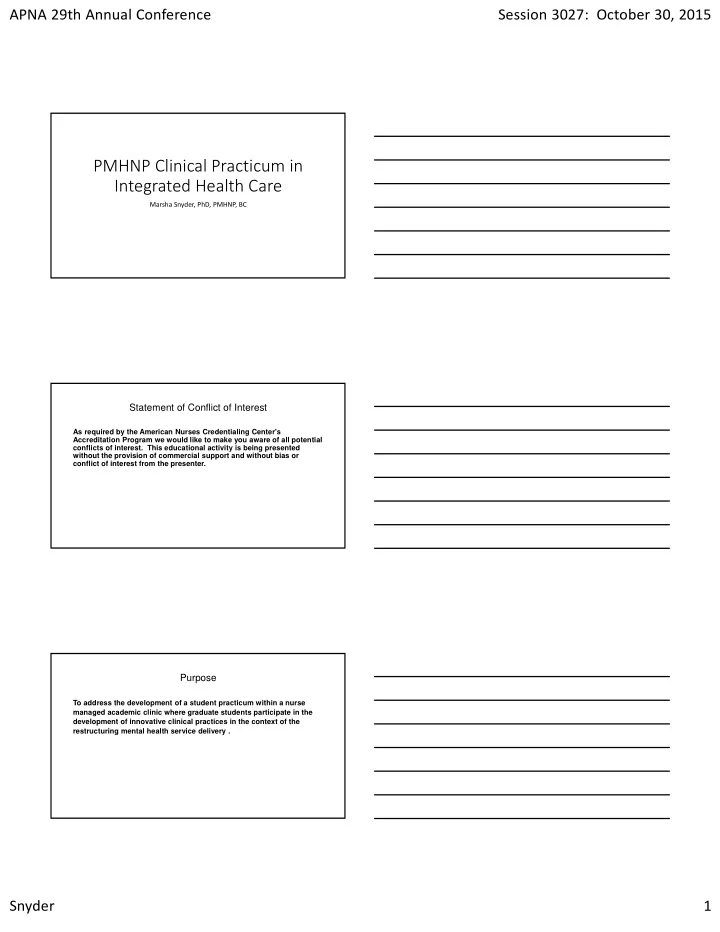

APNA 29th Annual Conference Session 3027: October 30, 2015 PMHNP Clinical Practicum in Integrated Health Care Marsha Snyder, PhD, PMHNP, BC Statement of Conflict of Interest As required by the American Nurses Credentialing Center's Accreditation Program we would like to make you aware of all potential conflicts of interest. This educational activity is being presented without the provision of commercial support and without bias or conflict of interest from the presenter. Purpose To address the development of a student practicum within a nurse managed academic clinic where graduate students participate in the development of innovative clinical practices in the context of the restructuring mental health service delivery . Snyder 1
APNA 29th Annual Conference Session 3027: October 30, 2015 Objectives • examine PMHNP competencies as these relate to an Integrated healthcare practicum • identify learning opportunities within a clinical setting for integrated learning • review outcomes related to an integrated practicum experience Current State of Affairs • Main entry Point for Psychiatric Care • Role of Primary Care Providers • Silos and Care Fragmentation Curriculum Meets Practice • Psychiatric Nursing and care coordination • Tailor and customize health care systems • Clinical Integration & Inter-professional collaborative Practice • resources • partnerships Snyder 2
APNA 29th Annual Conference Session 3027: October 30, 2015 IHC Model for Inter-professional Practice • Students who participate in the IHC model work collaboratively with primary care to: • integrate concepts, approaches, and processes of mental health nursing into the everyday provision of primary care • strengthen therapeutic alliance building and cognitive–behavioral change. Integrated System - Patient Simulation 6 Core Competencies for Patient Care • clinical knowledge • interpersonal and communication skills • professionalism • practice-based learning • systems-based practice Integrated System - Assessment • History and Physical Exam (Primary Care) • Laboratory; Radiology; • Psychiatric Evaluation (PMH) • Mental Status Exam • Use mental health screening instruments • Clinical guidelines (shared guidelines) for health promotion disease prevention • Ongoing Assessment to monitor psychiatric clinical progress as well as physical status Snyder 3
APNA 29th Annual Conference Session 3027: October 30, 2015 Integrated System - Therapeutics • Application of Pharmacotherapuetic knowledge and skills • Psychotherapy, psychoeducation, complementary/alternative medicine Integrated System - Health and Wellness Activities • Assessment of learning needs and goals of clients • Matching client needs with resources • Self-advocacy for health • Nutrition • Exercise for all fitness levels • Smoking cessation • HIV education, prevention, rapid testing & counseling • Individual and group formats • Synergy of an academic partnership • Chronic disease management • Screening for Trauma, follow-up resources Lessons Learned • Importance of true partnership between medical & mental health at all levels • Partnership within the College of Nursing • More planning around a cultural shift • Coordination is time-consuming • Importance of integration of public health, behavioral health, and primary care principles. Snyder 4
APNA 29th Annual Conference Session 3027: October 30, 2015 Ongoing Challenges • Space issues • Billing issues • Coordinating and planning for working with existing and future managed care entities • Reimbursement for coordinated activities • Building a group treatment element that which works in both primary care and mental health References Anema, M.G. & McCoy, J. (2010). Competency –Based nursing education: A guide for achieving outstanding learner outcomes. New York: Springer Pub. Collins, C., Hewson, D.L., Munger, R. & Wade, T. (2010). Evolving models of behavioral health integration in primary care. Taken from http://www.milbank.org/uploads/documents/10430EvolvingCare/EvolvingCare.pdf Mauer, B.J. ( 2003). Background Paper Behavioral Health/Primary Care Integration Models, Competencies, and Infrastructure . National Council for Community Behavioral Healthcare . Oregon Consortium for Nursing Education, (2012). Redesigning nursing education: Lessons learned from the Oregon experience. SAMSHA –HRSA Center for Integrated Health Solutions taken from http://www.integration.samhsa.gov/ Arial Bold, w hite, 36-42 pt • Arial = 24pt - 32pt Snyder 5
Recommend
More recommend